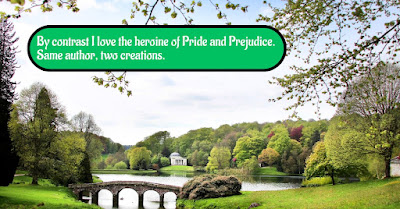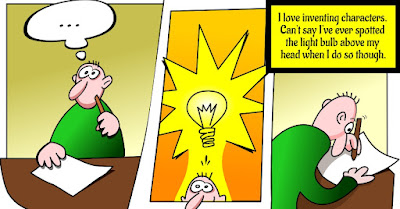Characters You Love and Loathe by Allison Symes
Image Credit: Images created in Book Brush using Pixabay photos.
I loathe Fanny Price from Jane Austen’s Mansfield Park -- always have done and always will. She is too insipid a character for my liking.
It has struck me she is too reliant on rotten things happening to other characters rather than trying to make her own happiness. Yes, those other characters deserve their comeuppance but come on, Miss Price, do something positive for yourself, will you?
Okay, but by contrast, I love Elizabeth Bennet, who knows her own mind, is flawed, and holds out for what she wants. Same author, same era, two well known creations, one of whom is significantly better than the other! I guess this proves no writer gets it right all the time. I take some comfort from that.
Characters for me make or break a story. I have to get behind them even if I don’t like them or want them to fail. I was torn with Robin Hood: Prince of Thieves. It is the only occasion when I wouldn’t have worried much if the Sheriff of Nottingham had won though that had everything to do with the late, great Alan Rickman’s wonderful acting.
As a flash fiction writer, I invent characters all the time. I’ve always loved that aspect of story telling so this is win-win for me. I know I loathe insipid characters. I also know I’m going to do my level best not to write any!
So I like to get my characters doing things, making mistakes, upsetting the old apple cart for other characters and so on. My characters have to deserve their reward. This is where I am glad writers don’t meet their characters for real in an alternative universe or anything of that nature. I suspect I might be in for an ear bashing from mine.
I have a soft spot for the rough diamond character (think Del Boy/Derek Trotter from Only Fools and Horses), the well meaning one (Rodney Trotter!), and the lovable but dim one (Trigger -- come on, you knew I’d pick him for that category. He is a shoe-in for it!).
With all of these, I can see where the characters are coming from and to an extent why they are the way they are. I have to understand that in my characters.
For me, that matters. If I can’t get inside their head, I’ve got no business writing their stories up. If they don’t grip me, why should anyone else be interested? I plan my “people” (not all are human incidentally) and by asking questions can get an outline together quickly.
There is one positive to the characters you love to hate. Analyse what it is you dislike. You can take what you learn here and apply it to your own stories. I do know I loathe the Fanny Price type. I’ll leave her in the pages of Mansfield Park where she belongs.





Comments
I'm glad Fanny Price does work for you, Sally, but she has never gripped me but Elizabeth and Anne Elliott and Emma - oh yes, I love those.
One of my favourite aspects to the Harry Potter series is when Dumbledore awards Neville points for standing up to his friends and that I thought was well done. I just wasn't convinced by Mansfield Park.
Oh, and I love Neville Longbottom too.